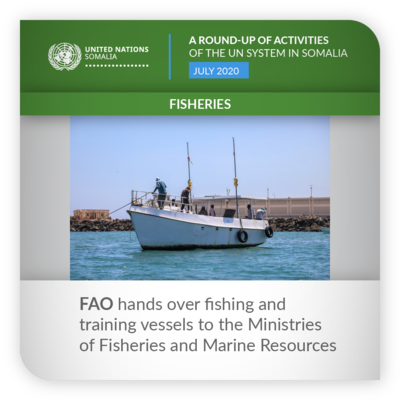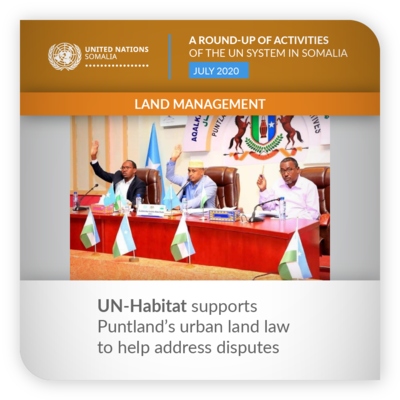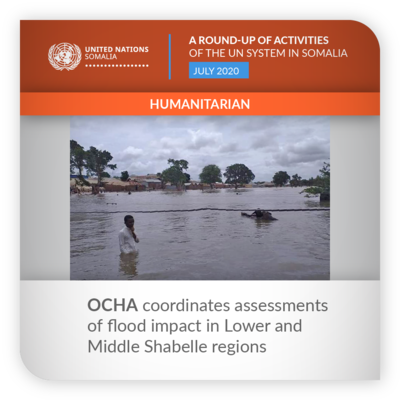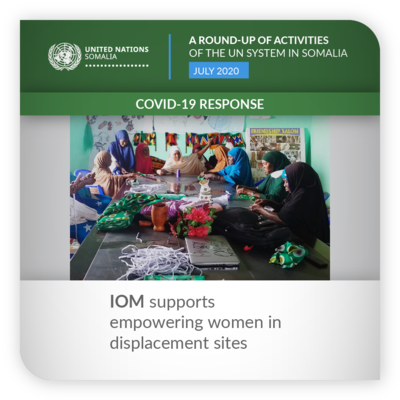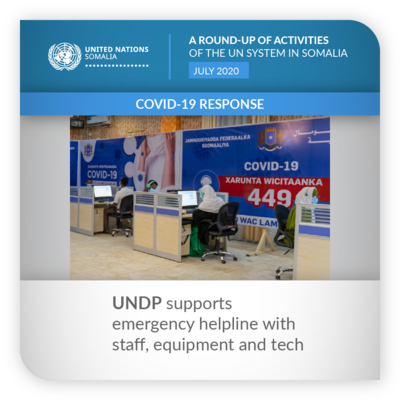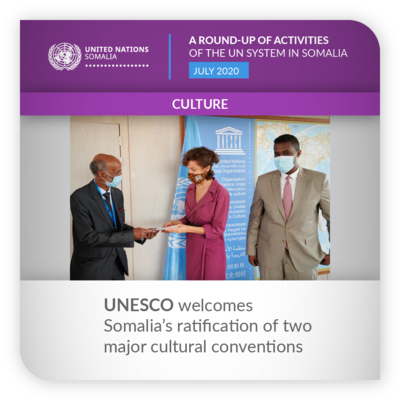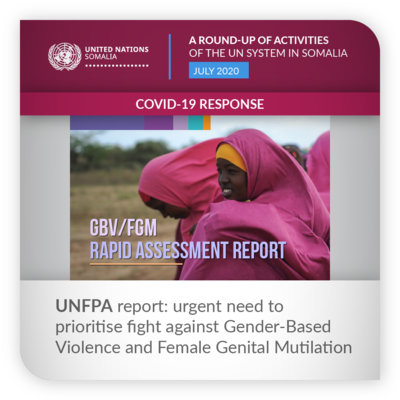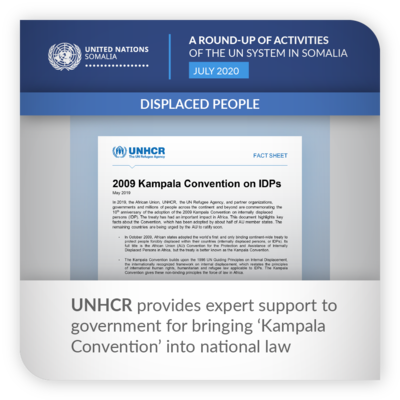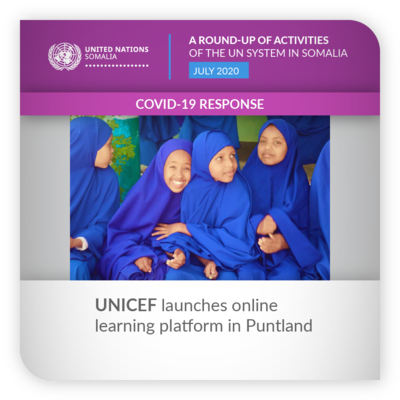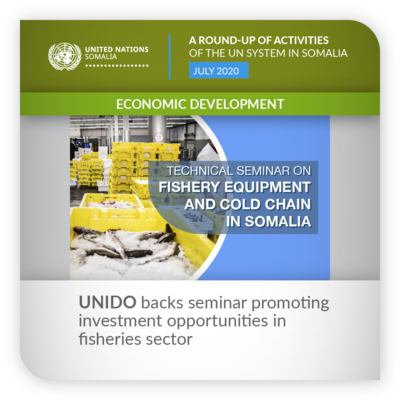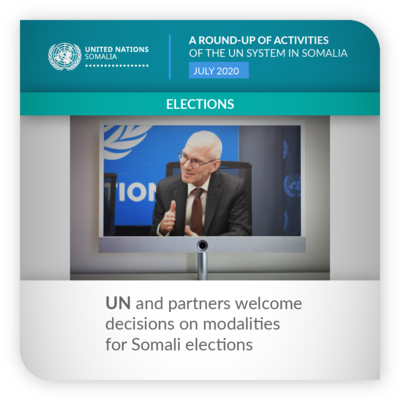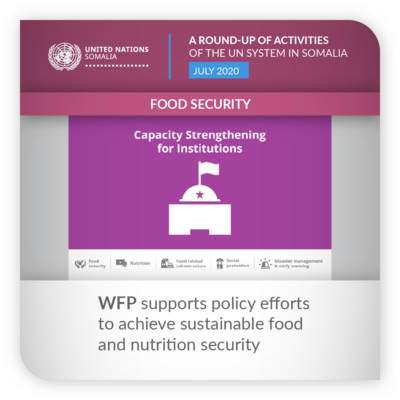A ROUND-UP OF ACTIVITIES OF THE UN SYSTEM IN SOMALIA IN JULY 2020
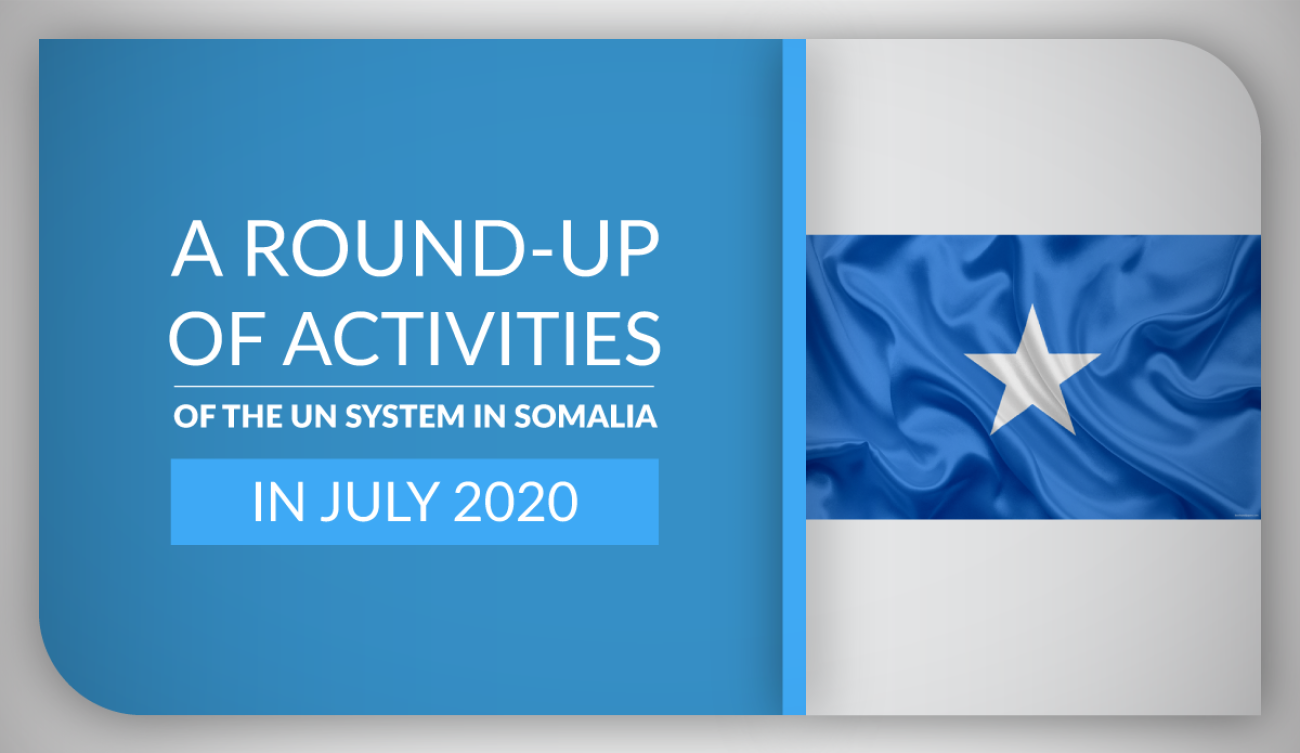
The COVID19 pandemic wasn’t the only challenge for Somalis during July - nor the only area where they made strides, supported by the UN family in Somalia.
|
|
Fisheries | FAO hands over fishing and training vessels to the Ministries of Fisheries and Marine Resources With European Union (EU) backing, FAO delivered two large fishing and training vessels to the Federal Government of Somalia and Puntland State, as part of its efforts to support the expansion of the fisheries sector and to provide decent employment opportunities for young people living in coastal areas. The handover is part of the EU-funded project ‘Coastal Communities Against Piracy,’ which the UN agency has been implementing since 2016, together with the various Ministries of Fisheries and Marine Resources across the country. Last year, FAO handed over 12 vessels to fishing co-operatives in Puntland. Two remaining large vessels will be soon completed and handed over to Galmudug and Jubaland authorities. A cornerstone of the project is the design and construction of artisanal fishing vessels that are made in Somali boatyards. These watercraft boast improved safety features, incorporating new sustainable fishing gear, heavily insulated fish storage holds and modern, fuel-efficient engines. They also provide a platform for fishing training as part of long-term capacity building to improve fishing skills, standards of on-board handling and safety, and build capacity in vessel and engine operation and maintenance. |
|
|
|
Land management | UN-Habitat supports Puntland’s urban land law to help address disputes UN-Habitat has been working with Puntland’s authorities – mainly its Ministry of Public Works and Transport – in developing an Urban Land Management Law, which was enacted by the Federal Member State’s parliament in mid-July. The law is expected to help reduce land disputes and conflict – which are major challenges in Somalia, where the context involves internally displaced people, returnees and host communities. The law covers vital land management components such as land rights, access to public spaces, land allocation and land use planning methods, land value capture, land dispute mechanisms and clarification of institutional responsibilities of district and state authorities. It is expected that land governance processes will improve in Puntland as this law will provide a much-needed legislative guiding framework. The UN agency carried out the work through the UN Joint Program on Local Governance and Decentralized Service Delivery. https://twitter.com/UNHabitat_Som/status/1285176507950862338 |
|
|
|
Humanitarian | OCHA coordinates assessments of flood impact in Lower and Middle Shabelle regions With local authorities and partners, OCHA coordinated rapid multi-sector assessments on the impact of flooding in Somalia’s Lower and Middle Shabelle regions. In the Lower Shabelle region, the assessment found that up to 71,000 people have either been affected or are at risk of flash floods in Afgooye and Wanla Weyne districts when the Shabelle riverbanks broke in early July. Those affected include 13,000 people who have been displaced in the Afgooye district and 29,000 displaced in Wanla Weyn. In the Middle Shabelle region, an assessment found that flash and riverine floods have displaced at least 66,000 people and damaged 33,000 hectares of farmland in the Balcad district. So far, at least 191,800 people have been affected by floods and 124,000 displaced across Somalia since late June. |
|
|
|
COVID-19 response | IOM supports empowering women in displacement sites Under the Women Participation Project (WPP), IOM is empowering groups of women living in displacement sites in Doolow, in southern Somalia, to take the lead and keep their community safe from COVID-19. In July, IOM trained and donated sewing materials to women's committees and groups to design face masks for the community. Since the first COVID-19 case was confirmed in Somalia last March, IOM has run community engagement activities to contain the coronavirus in displacement sites around the country. Internally displaced people are at high risk due to the often crowded and unhygienic conditions they live in, where access to clean water continues to be a luxury for many. |
|
|
|
COVID-19 response | UNDP supports emergency helpline with staff, equipment and tech UNDP continues to support staff, equipment and data tracking software for the government's 449 emergency call centre. The centre deals with thousands of calls every day; provides information on COVID-19 symptoms, treatment and protection methods; and directs emergency assistance. |
|
|
|
Culture | UNESCO welcomes Somalia’s ratification of two major cultural conventions UNESCO applauded Somalia’s recognition of the leading role that culture can play in the country’s efforts towards peacebuilding and sustainable development. The welcome followed the presentation in Paris of the original instruments of ratification of the UNESCO Convention Concerning the Protection of the World Cultural and Natural Heritage and the Convention for the Safeguarding of the Intangible Cultural Heritage. Somalia was the final country in Africa to join the World Heritage Convention. UNESCO said Somalia has a wealth of built and natural heritage, as well as living heritage, and the implementation of these standard setting instruments, along with the international network of support they offer, can help to ensure the safeguarding and conservation of this heritage. https://en.unesco.org/news/somalia-ratifies-two-major-unesco-cultural-conventions |
|
|
|
COVID-19 response | UNFPA report: urgent need to prioritise fight against Gender-Based Violence and Female Genital Mutilation Gender-Based Violence (GBV)and Female Genital Mutilation (FGM) remain major problems for women in Somalia. UNFPA released a study – ‘GBV/FGM Rapid Assessment Report - in the context of COVID-19 Pandemic in Somalia’ – which indicates that COVID-19 is leading to circumstances which increase the risk of exposure for women and girls to higher levels of both GBV and FGM. The rapid assessment was undertaken to generate data and information on the impact of the pandemic on GBV/FGM incidents and how to best respond to it. |
|
|
|
Displaced People | UNHCR expert support to government bringing ‘Kampala Convention’ into national law UNHCR brought a world-renowned expert on the rights of internally displaced people (IDPs), Dr. Chaloka Beyani, to offer support to the Somali government in its quest to incorporate the African Union Convention for the Protection and Assistance of Internally Displaced Persons in Africa – also known as the ‘Kampala Convention’ – into national law. The expert’s appointment follows a request made to UNHCR by the authorities in March this year. The Somali president signed the Kampala Convention after a near-unanimous vote by parliament in November 2019. The treaty addresses internal displacement caused by armed conflict, natural disasters and large-scale development projects in Africa. |
|
|
|
COVID-19 response | UNICEF launches online learning platform in Puntland UNICEF and the Government of Puntland launched the Learning Passport, a digital remote learning platform in which children can access educational content both online and offline from their homes. The platform allows children to access high-quality lessons in line with the official curriculum and not become the hidden victims of the COVID-19 crisis by missing out on an education. The initial stage of the rollout will provide more than 11,000 children, almost half of them girls, access to over 600 recorded lessons and videos. |
|
|
|
Economic Development | UNIDO backs seminar promoting investment opportunities in fishery sector With partners, UNIDO held a ‘Technical Seminar on Fishery Equipment and Cold Chain in Somalia,’ to help advance cooperation between Somali and Italian small- to medium-sized enterprises (SMEs), with the aim of accelerating inclusive and sustainable industrial development in the country’s cold chain and fishery equipment sector. At the digital meeting, a delegation of more than 20 Somali SMEs demonstrated their business activities in the areas of production, service and trading of agro-fishery and seafood products, in order to foster potential new partnerships. As well, Italian companies and associations presented innovative solutions to their Somali counterparts, with discussions on areas such as technological upgrades in the Somali fishery equipment sector and fish processing, conservation and supply chain, alternative fishing models, advanced boat engines, efficient systems for the production and packaging of fishing nets and quality refrigeration in the frozen-food industry. The international participants included Federpesca, Consorzio Pescato Procidano, Consorzio Sviluppo ittico toscano, Mediterranea Reti, AS Labruna, Assoittica Italia, Movinox, New Cold System, and Self Globe. |
|
|
|
Elections | UN and partners welcome decisions on modalities for Somali elections Somalia’s international partners, including the United Nations, welcomed the decisions reached by the leaders of the country’s Federal Government and Federal Member States in Dhusamareb in late July as an important step towards achieving broad-based agreement on the modalities for the country’s elections. Subsequently, partners also expressed their concern and their strong hope that recent political developments, including in the Federal Parliament, would not undermine efforts to reach political consensus on timely elections, disrupt Somalia’s reform agenda, or create instability that may reverse the gains made so far on national priorities. |
|
|
|
Food security | WFP supports policy efforts to achieve sustainable food and nutrition security In addition to providing lifesaving and lifechanging assistance to vulnerable Somalis, WFP has been working with the Federal Government of Somalia on policies, systems-building and operational capacities to improve efforts in the areas of food security, nutrition, social protection, resilience, disaster risk management and early warning systems. The UN agency undertakes this twin approach with the goal of strengthening national institutions to deliver services to food-insecure and nutritionally vulnerable people in a timely and efficient manner. |

